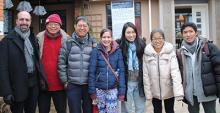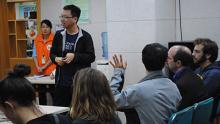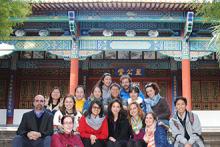Visit to China Expands Knowledge of Social Work and Urbanism
SSA Students learn how problems are tackled in another culture
By William Harms
VOLUME 23 | ISSUE 2 | SUMMER 2016
The issues social workers try to address can be similar in various cultures, but the approaches to dealing with them can be different.

To learn about those similarities and differences, a group of nine SSA students joined students and faculty from the Hong Kong Polytechnic University (PolyU) to examine Chinese responses to urbanization in the China Winter Institute 2015: Urbanization, Migration and Poverty: State and Community Responses in Hong Kong and Mainland China.
The institute is part of an SSA initiative to become involved with the work of social workers and social work scholars globally. China is seeking to expand its number of social workers.
SSA has partnered with Peking University (PKU) in Beijing and a group of other schools. The work is part of the China Collaborative, a project of the Council on Social Work Education, the China Association of Social Work Education, and the International Association of Schools of Social Work, to help develop social work education in Mainland China. Hong Kong has its own social welfare and social work education system that is similar to Western social work. In Hong Kong, SSA has built a strong relationship with PolyU.
“We live in an increasingly globalized world,” says SSA Professor Robert Chaskin, who helped organize the institute. “The policy responses vary in different contexts. This institute was an opportunity to study the role of the state and other actors in responding to social problems in situations that are different from those in the US.”
The institute, the third one of its kind in China arranged by SSA, was held from December 7-18 with visits to social service agencies in Hong Kong and mainland China, including Guangzhou in the east and Kunming in western China. In addition to the visits, the institute included lectures and seminar discussions.
“Overall, the biggest take away for me was seeing how a country we tend to think of as very different from the US has so much in common with us," says SSA student Susy Gomez. "Some of our hot issues include immigration, education, and urban housing, which were also concerns for China and Hong Kong."
She adds that the institute "helped me to practice comparing and contrasting these issues between the US, Hong Kong, and China. This is a skill that will be very useful in my career as an international social worker."
A particular focus for the institute was the role of social organizations, which provide services to children, the elderly, and migrants. They are largely supported by government funds.

"The Chinese are facing a number of social problems, brought on in part by large flows of migrants from rural to urban areas," Chaskin explains. "To deal with these issues, the Chinese are expanding the field of social work and aim to train up to 2 million social workers by 2020."
The profession is growing in many ways, he says, but is still underdeveloped. The social organizations are also relatively new.
When the group travelled to Kunming, they stayed in a youth hostel operated by Heart to Heart, a social organization that also operates other programs in the community. Kunming, about 735 miles west of Hong Kong, is a city of about 3 million.
People from villages, many of whom are ethnic minorities, have moved to Kunming for employment, a situation common in China, where industrialization has led to rapid urbanization.
"We learned about a social enterprise set up for women to repurpose clothing by turning it into other items. We visited a shop where the crafts are sold," Gomez says.
Nathan Roter, another SSA student who was part of the institute, said he enjoyed talking with the Chinese students who were part of the group.
"It is useful to make connections in other countries. It was good for me to get a perspective that was not based in the United States," he said
